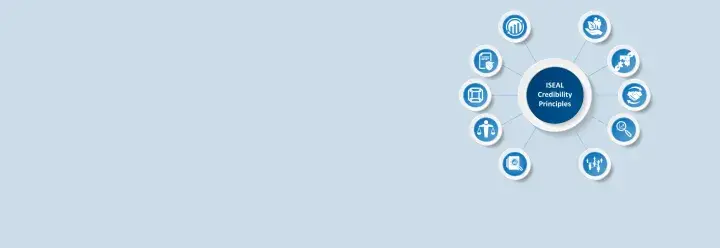Help shape more effective solutions to sustainability challenges by joining the consultation on ISEAL’s updated Code of Good Practice
From fighting poverty to tackling climate change and nature loss, sustainability standards and similar systems are playing a critical role in addressing the world’s most pressing challenges. Ensuring that sustainability systems deliver effective solutions has never been more important.
The increasing choice and variety of market-based sustainability approaches can be bewildering. How can businesses, policymakers and sustainability advocates distinguish the credible systems that lead to real impacts from those that over-promise and under-deliver?
Last year, ISEAL updated its Credibility Principles, which define the core values of credible and effective sustainability systems – from stakeholder engagement and measurable progress to transparency and truthfulness. Now we’ve updated and integrated our Codes of Good Practice into a single Code that provides a global reference on what sustainability systems need to do to put these principles into practice. On 22 September, we’re launching our public consultation on the new Code, and we want to hear from experts in all fields to ensure it reflects best practice and remains fit for the future.
- Join us at the launch webinar on the 22 September
- Participate in our consultation survey as of 22 September
Until now, ISEAL has had three separate Codes covering Impacts, Standard-Setting and Assurance. By combining these along with essential practices from ISEAL’s Sustainability Claims Good Practice Guide, we have developed a single Code that looks at the core responsibilities of a sustainability system with a more holistic approach. Reflecting recent developments in the sustainability landscape, the Code has been updated to remain relevant in addressing the sustainability challenges we are all facing.
The growing role of sustainability systems
From agriculture and fisheries to tourism and infrastructure, sustainability systems are active in an ever-growing range of sectors. Companies use them in many aspects of their business, from implementing sustainable sourcing policies and strengthening trading relationships, to supporting due diligence efforts and reporting to shareholders. They also provide useful tools for governments and the finance sector – to demonstrate compliance with sustainable procurement policies, for example, or for screening investments for environmental, social and governance (ESG) risks.
While ISEAL’s original Codes of Good Practices were initially designed for voluntary standards and certification schemes, the revised Code applies to a wider range of sustainability systems. Recent years have seen a growth in market-based approaches to improving sustainability, from jurisdictional or landscape-level verification schemes to enterprise-level certification, from ratings systems to improvement monitoring programmes. We want to encourage innovation and new approaches and enable companies to find the best tools for advancing their sustainability objectives, while holding all models to the same expectations when it comes to reliably delivering results.
The new Code equips systems to be more focused on impacts and performance monitoring, making them more effective at driving improvements in the areas that matter. It also widens the range of practices addressed, looking at good governance practices and due diligence requirements, while also tackling the question of credible claims.
This expanded scope for the Code is particularly relevant in the light of upcoming legislation. Credible sustainability systems can play a critical role in ensuring credible consumer claims, supporting the EU directive on empowering consumers for the green transition, for instance. Sustainability systems can also help companies meet important due diligence obligations, both for specific issues and commodities (deforestation, conflict minerals, etc.), and for general due diligence on environmental, social and human rights risks such as the European Commission has proposed earlier this year.
Get involved
In whatever way that sustainability systems are relevant to your work, we’d love to hear your views, and there are multiple ways to contribute.
Join us at the launch webinar on 22 September.
We’ll also be running an online survey, as well as hosting further webinars and virtual workshops. Stay up to date with these activities on our consultation page.
You can also learn more about ISEAL Code Compliant sustainability systems: these are organisations that implement ISEAL’s Codes, demonstrating a rigorous approach to continual improvement.


